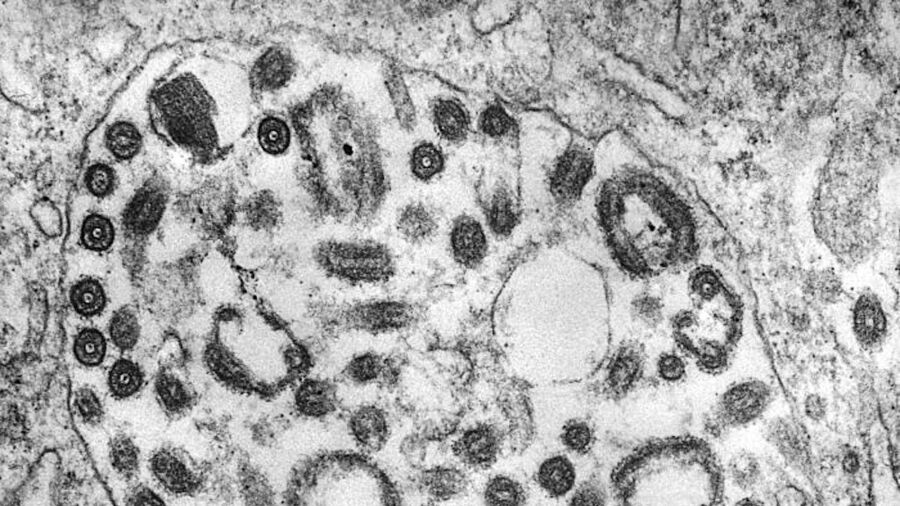The Centers for Disease Control and Prevention (CDC) warned doctors in an update on Thursday that they should be aware of growing outbreaks of the highly fatal Marburg virus in Africa and will start communicating with travelers to the United States to watch for symptoms.
Like Ebola, Marburg virus disease (MVD) is a a rare but severe hemorrhagic fever that affects humans and primates, causing bleeding from the nose, gums, eyes, and other areas. The World Health Organization (WHO) estimates that it has a fatality rate of about 50 percent, with some case fatality rates varying from 24 percent to 88 percent in past outbreaks.
“Currently, the risk of MVD in the United States is low; however, clinicians should be aware of the potential for imported cases. It is important to systematically assess patients for the possibility of viral hemorrhagic fevers,” the CDC warned on Thursday in a “Health Alert Network Health Advisory.”
It noted that there are two Marburg outbreaks in Tanzania and Equatorial Guinea, adding that there is “no evidence to suggest that these two outbreaks are related.” The alert said that it’s likely that the outbreaks “represent two independent animal-to-human spillover events.”
“To date, no confirmed cases of MVD related to these outbreaks have been reported in the United States or other countries outside Equatorial Guinea and Tanzania. This Health Advisory provides information about these outbreaks to increase awareness of the risk of imported cases in the United States,” the CDC said.
Those with Marburg aren’t contagious until symptoms show up. They include fever, muscle and joint pain, headache, fatigue, unexplained bleeding, and gastrointestinal problems. The virus is spread via contact with the blood or other bodily fluids, the CDC said, adding that it doesn’t spread via airborne transmission.
Amira Roess, a global health and epidemiology professor at George Mason University, told NBC News that the recent Marburg outbreak appears to be more widespread than previous ones.
“We’re definitely seeing an increase in those more severe cases and we’re also seeing just more transmission in the areas where we haven’t seen these viruses before,” Roess said. “It is concerning.”
Other Details
So far, local authorities in Equatorial Guinea have confirmed 14 cases since an outbreak was declared in February, while 10 people have died. The CDC said that eight cases have been confirmed in Tanzania, and five have died.
But in Equatorial Guinea, located on the African continent’s central western coast, cases have been reported across the country, officials have warned.
“Though we do not know yet the origin of the Marburg outbreaks in Equatorial Guinea and Tanzania, we do know that there continues to be increased capacity in Africa to recognize and test samples for viral haemorrhagic fevers like Marburg and Ebola,” the WHO’s Dr. Tieble Traore said on April 4.
There are no direct flights from either Tanzania or Equatorial Guinea to the United States. “Currently, no enhanced domestic travel measures are recommended, as the overall risk in the United States is considered low at this time,” the CDC’s alert said.
In response to the outbreak reports, the White House released a statement late last month saying the United States has provided protective gear as well as “technical support” to Tanzania. An American laboratory was set up in Equatorial Guinea on March 10, and officials are now training local medical authorities to diagnose suspected cases of the virus, according to the U.S. Department of State.
There is no FDA-approved treatment or vaccine for the virus, the alert said. The CDC recommends that Marburg be treated with early fluid replacement and intensive supportive care.
However, some drug manufacturers have been working on an experimental shot, including one from the Sabin Vaccine Institute, CBS News reported. About 750 doses of the vaccine, based on a chimpanzee adenovirus, are slated to be deployed in Equatorial Guinea.
“When the conditions may be favorable, the [vaccine] trials may be initiated. So right now is building the basics of good alert management and case management and other basics of the outbreak response. And at a future date may be considered, but as of now, we don’t have a firm date for when it will start,” the WHO’s Dr. Abdi Mahamud told reporters, according to the outlet.
From The Epoch Times


